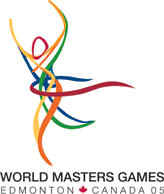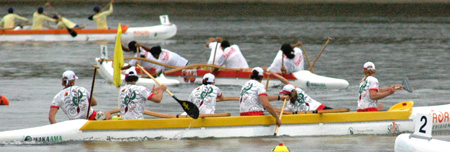
World Masters Games has been a good experience and an international
event. All that I was hoping for.
The marathon races had attendees from Canada, USA, Denmark, Poland,
Sweden, Russia, Germany, Australia, England, Scotland, Czech Repulic,
Bulgaria, and more. Events included Kayak1, Kayak2, Kayak4, High
Kneel Canoe1, High Kneel Canoe 2, OC1, Marathon Canoe2, and Marathone
Canoe 1, in both men’s and women’s. Competitors ages ranged from 30
into the 70’s. The depth of experience was incredible, and ranged
from beginner racers to world class racers still actively paddling and
retired. Concurrently running was the Canadian Marathon Canoe
Championships. I have never seen such a good showing of marathone
canoeists.
The distance course was challenging for some while others had full
experience with the situation. The course was on a river and paddlers
were having to deal with current and depth fluctuations which all
effect boat speed. The current was changing daily because rains, and
overflow from an upstream dam, so what was clean water one day could
be shallows the next. It was not uncommon to see someone stuck in the
shallows. To the experienced marathon canoeists this was a practised
event, to the outrigger paddler it was a bit intimidating. For those
of us who had little experience with river running we tended to follow
the leader and hope they knew what we were doing. I have a greater
appreciation for river running and the knowledge needed to create the
“best line”.
The sprint events showed even more participation from other countries.
The course was well layed out. Events included all of the ICF events
and OC1 both in 500 and 1000m. Age categories started at 30 and went
on to the 70’s. The races were well run and very punctual.
WMG’s has left some lasting impressions on me. Here, aging, which is
happenig to all of us, loses it’s hinderance. Life becomes
celebrated. One impression for me was at the medal ceremony for K1
Men’s -70. It was obvious that the fellows knew each other very well.
They were from different parts of the world but very connected.
Although I don’t know for sure, it is entirely possible that these men
have been competing together for their entire paddling careers. For
them, at this event, time had stood still. Another was in
conversation with Hugh Fisher, Olympic Gold medalist. His comment
that he began chuckling to himself in a race just because he felt like
a kid again – charging down the river with international competition.
Seeing these athletes competing at all ages is truly remarkable and
I’m glad that I have had the opportunity to compete in this
international experience.
~ Neda
